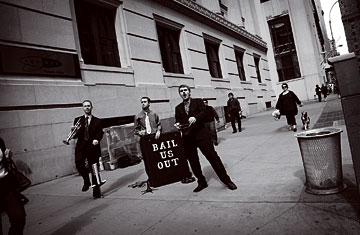
Shades of the past: Echoing scenes from the Great Depression, New York City street performers lampoon Wall Street bailouts
It was, for a few years in the middle of this decade, the trope that you heard all the time. The global economy, it was said, was a "Goldilocks" one. Just like the bowl of porridge that the child in the fairy tale sampled, it was neither too hot, nor too cold. It was — wonderfully, warmly — just right.
It's worth thinking how that analogy might be extended into our times. The global economy, you might say, now resembles the sort of congealed, cold, gray, glutinous bowl of oatmeal, curling up at the edges, that was once to be found in the lesser sort of Scottish boarding houses, with a couple of flies dancing a lazy highland reel on its surface. (See pictures of the global financial crisis.)
It is, in short, not an appetizing sight.
Since the summer of 2007, when nonexperts started to understand that subprime refers not to a U.S. Department of Agriculture grade of steak but a mortgage whose originator had no real prospect of recovering its debt, the world's economic and financial systems have lurched from one astonishing event to another. The mayhem among U.S. commercial and investment banks in the fall of 2007, the Fed's panicky 75-basis-point interest-rate cut of January 2008, the fraud at SocGen, the fire sale of Bear Stearns, the bankruptcy of Lehman Brothers, the rescue of AIG, CDOs, TARP, recapitalization, Madoff, Satyam, Citi, RBS ... and so it goes, until even the most diligent of chroniclers runs out of acronyms and polysyllables and ceases to believe that the story they are telling can possibly have happened. Goldilocks? To describe the travails of the global economy in the past 18 months would require an imagination darker than that of the Brothers Grimm.
But this is a not a fairy tale. It is a story in which figures and financial flows (or rather, the lack of them) translate into reductions in life chances for millions, as jobs, household incomes and retirement savings accounts all disappear. This year, says Stephen Roach, chairman of Morgan Stanley Asia (and one of a handful of economists who can legitimately claim that they had long predicted that an economy built on debt and asset-price bubbles would one day collapse), will be "the worst recession year since 1982," with global growth of just 1%. Roach adds: "The risk is it could be worse." Jim Walker, from the research firm Asianomics, chooses a different comparator as he looks to the global economy this year. "We haven't seen anything like this since the 1930s," he says, guessing that the U.S. economy will contract by anything between 2.5% and 5% of GDP. Matthew Sharratt, an economist at Bank of America in London, predicts a 2.9% drop in GDP for the U.K., "the worst recessionary experience since the 1970s."
If not quite so gloomy, new European Commission forecasts for the Continent's leading economies are nothing to cheer: the Commission expects Germany to contract by 2.3%, Italy and Spain by 2% and France by 1.8%. Japan's economy, too, is expected to shrink this year. Reduced demand in the rich world for goods from newly industrializing nations means that the shocks have spread even to those economies whose turbocharged growth led some to claim, as late as 2008, that the booming nations of the developing world had become decoupled from the slow-growing, mature economies on either side of the Atlantic. Some decoupling; as export markets shrink while Western consumers rebuild their battered household balance sheets, growth in China, according to Goldman Sachs, is expected to slow from 8.9% in 2008 to 6% this year.
Nor is it likely that 2009 will bring an end to the torpor. Economies are naturally cyclical. Changes in asset prices provide buying and selling opportunities for those willing to hazard their fortune. The creative destruction of capitalism means that, much like a flock of vultures, some industries and enterprises will always find nourishment in the misfortunes of others. But the timing of the recovery phase of this cycle, and its strength, is in doubt. Sharratt says it is possible that the U.K. will not see any semblance of a recovery until "later on in 2010." Roach hopes that things will look better by the end of 2009, but warns that "any recovery when it comes will be ... anemic, and not strong enough to prevent the unemployment rate from continuing to rise in much of the world." And that would be a rise from levels that already sting: December's unemployment rate of 7.2% in the U.S. was the highest since 1993.